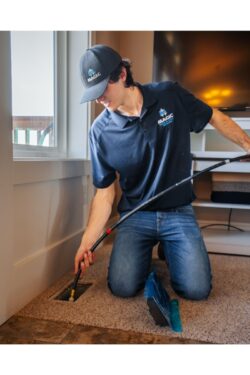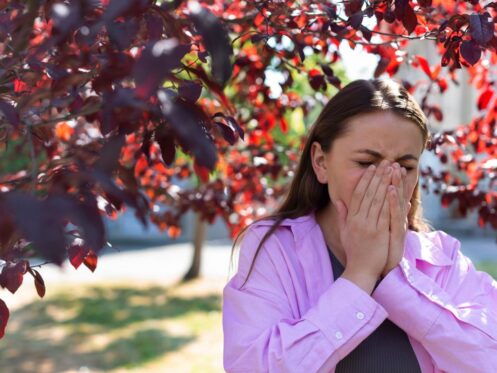Spring in Jerome, Idaho is a beautiful time—flowers begin to bloom, and the outdoors comes alive again. Unfortunately, for many homeowners, it’s also the start of a tissue-filled allergy season. But did you know that your HVAC system can be a powerful ally in managing allergens and improving your air quality?
Your HVAC system does more than just regulate your home’s temperature; it also plays a vital role in the air quality you and your family breathe every day. With a few simple steps, you can transform your HVAC system into your best defense against spring allergies. Wondering how? Let’s break it down.
Benefits of Regular HVAC Maintenance
You may have heard that you need to maintain your HVAC system, but have you ever thought about why? Investing time and effort into maintaining your HVAC system doesn’t just help with allergies—it offers a host of year-round benefits, too.
- Enhanced Air Quality: A well-maintained system actively reduces pollutants and irritants.
- Energy Efficiency: A clean system operates more efficiently, leading to lower energy bills.
- Longer Lifespan: Regular maintenance extends the life of your HVAC system, saving you from costly replacements.
- Cost Savings: Preventative care reduces the risk of expensive repairs and emergency breakdowns.
These benefits can make a huge difference in creating a healthier, more comfortable space for your family, but when spring rolls around, reducing any allergy symptoms will take top priority.
How Your HVAC System Can Help with Allergies
An often-ignored fact about HVAC systems is their ability to filter and circulate clean air, reducing allergens in your home. These systems can capture common allergens like pollen, pet dander, dust mites, and most mold spores, ensuring the air you breathe indoors is cleaner and healthier.
- Air Filters: The filters in your HVAC system are designed to capture airborne particles. When maintained properly, they significantly reduce allergens in the air.
- Airflow Movement: Proper airflow cycles can keep allergens from settling on surfaces in your home.
- Humidity Control: Excessive humidity encourages mold growth, which can worsen your allergy symptoms. Your HVAC system helps maintain a balanced humidity level, reducing this risk.
If you’ve been sneezing more than usual or waking up with itchy eyes, your HVAC system might need some attention. Here’s how you can prepare your system for the allergy season ahead.
4 Essential Steps to Prep Your HVAC for Allergies
1. Change or Upgrade Your Air Filters
This is the simplest, yet most effective way to enhance your HVAC’s performance during allergy season. Air filters are your first line of defense and neglecting them can cause harmful allergens to stay in your home.
But not all air filters are created equal! The most common types—fiberglass, pleated, electrostatic, and HEPA—each offer increasing levels of protection.
Fiberglass filters provide the most basic defense, catching only larger particles.
Pleated filters are a step up, trapping more dust and pollen.
Electrostatic filters use a static charge to capture finer particles like smoke or pet dander.
HEPA filters ensure the highest level of protection against nearly all airborne particles—including allergens, mold, and bacteria.
When it comes to the highest level of protection, HEPA filters remove nearly all airborne particles, guarding against allergens, mold, and bacteria.
- Frequency: Change your air filters every 1-3 months, or more often if you have pets or severe allergies.
- Upgrade to Your Filters: Depending on the type of filter you are currently using, upgrading may make a difference in your air quality. High-Efficiency Particulate Air (HEPA) filters are specifically designed to trap smaller particles like dust, pollen, and bacteria.
Pro Tip: Check your system’s specifications before upgrading filters to ensure compatibility.
2. Clean Out Ductwork
Your air ducts are responsible for moving air throughout your home. If they’re filled with dust and debris, those allergens will circulate every time your HVAC system runs. 
- Inspect Your Ducts: If you notice dust buildup around vents or inconsistent airflow, it’s time for a cleaning.
- Hire Professionals: While minor cleaning can be done yourself, scheduling professional duct cleaning ensures thorough removal of allergens and debris.
Bonus Benefit: Clean ducts can improve system efficiency, saving you money on your energy bills.
3. Optimize Humidity Levels
While Jerome’s spring weather may not bring too much change in humidity, you may find your home’s humidity changing with the seasons. Too much humidity can create the perfect breeding ground for allergens like mold and mildew, while too little humidity can lead to dry skin, irritated sinuses, and cracked furniture. Your HVAC system can help maintain a healthy humidity level, but only if it’s working properly.
- Install a Dehumidifier: If your home feels damp, adding a dehumidifier to your HVAC system can prevent mold growth and reduce allergens.
- Monitor Levels: Aim to keep your indoor humidity between 30-50% for optimal comfort and allergy control.
4. Schedule Professional Maintenance
Routine maintenance is the key to keeping your HVAC system running efficiently and allergy-free. An HVAC professional can inspect your entire system, fix potential problems, and ensure it’s ready for allergy season.
Here’s what a professional tune-up typically includes:
- Cleaning internal components like coils and blowers.
- Checking for mold, leaks, or blockages in your system.
- Ensuring proper refrigerant levels and airflow.
Think of it like a spring clean for your HVAC—keeping it running smoothly while ensuring the air in your home is clean and fresh.
Let Magic Electric, Plumbing, Heating + Air Help You Breathe Easier
If prepping your HVAC for spring allergies feels overwhelming, you don’t have to go it alone. At Magic Electric, Plumbing, Heating + Air, we specialize in keeping homes in Jerome, Idaho comfortable and allergen-free.
Our expert team offers everything from duct cleaning to professional system tune-ups, helping you get ready for allergy season without the hassle. Contact us today to schedule your HVAC service—your health and comfort are our top priorities!


